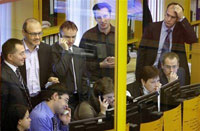Russian stock exchanges halt trading
Russian stock exchanges halted trading Friday after stocks shot higher, rebounding off a two-day closure amid a financial crisis as the government rushed through emergency measures that included more money for banks and purchases of shares to stem plunging prices.

Exchanges suspended trading for a second time in just several hours of trading Friday after shares rose too sharply. Trading was to resume later in the day.
In a volatile morning, the benchmark RTS and MICEX saw shares surge by 20 percent and 26.3 percent, respectively.
The surge came after the government stepped in to stimulate the shattered stock markets and shore up confidence in the troubled banking sector.
The dollar-denominated RTS halted trading for a second time Friday after suspending trade in several stocks - including Lukoil, which jumped by nearly 20 percent. Trading was to resume at 2:55 p.m. (1055GMT) but was delayed. No reason was given. MICEX shut down for an hour at 2:15 p.m. (1015 GMT).
Normal trading on both indexes was closed down on Wednesday after the MICEX suffered one-day losses on a scale not seen since Russia's 1998 financial collapse. It plunged 25 percent in just 2Ѕ days on the back of tumbling oil prices and Wall Street turmoil, and was down more than 55 percent since its May peak.
Although initially seen as slow to act, the government stepped in to reassure investors and head off the possibility of a wider loss of confidence spreading to the population.
Stocks bounced back after the government rushed through a series of emergency measures - amounting to some $120 billion worth of relief - in the shape of increased liquidity to the banking sector and share purchases on the domestic markets.
Russia's comeback came as global markets also staged a recovery Friday after efforts to restore confidence and limit the damage wreaked by the global financial crisis.
Speaking at an investors' meeting in the Black Sea resort of Sochi, Prime Minister Vladimir Putin tried to soothe the fears of foreign investors in an effort to attract some of the world's swiftly-draining pool of investment capital.
Putin assured investors that, because of Russia's huge foreign exchange reserves and other surpluses, Moscow could still balance the budget for the next three years even if oil drops to between $40 and $50 a barrel. Oil has fallen below $100 after reaching a record $147 a barrel in July.
Despite assurances from the government, however, it may take longer for the wounds to heal, after investors suffered huge losses on the Russian stock markets.
"People were skinned alive," said James Fenkner, managing director at Red Star Asset Management. "They got creamed. ... It's going to be a while before they come back."
Subscribe to Pravda.Ru Telegram channel, Facebook, RSS!

